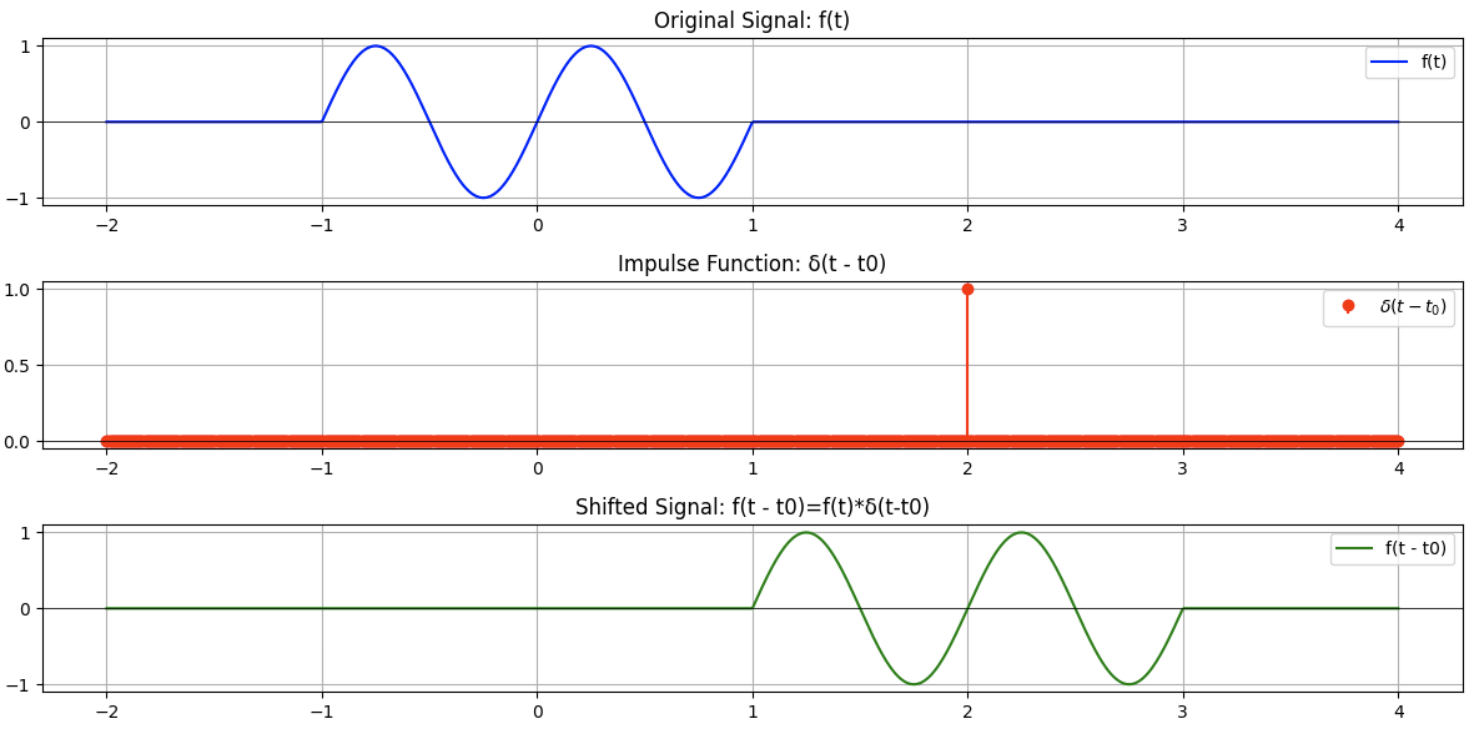0. shifted impulse와 convolution은 결국 shifting 연산임
$t_0$로 shifting을 시킨 impulse function $\delta(t-t_0)$과의 convolution은
결국 같은 $t_0$만큼 signal을 shifting하는 것으로 볼 수 있음.
$$f(t)*\delta(t-t_0) = f(t-t_0)$$
- $*$ : convolution

1. 증명
$$ \begin{aligned} f(t)* g(t) &= \int^\infty_{-\infty} f(t-\color{red}{\tau}) g(\tau) d \tau \\ f(t)* \delta(t-t_0) &= \int^\infty_{-\infty} f(t-\tau) \delta(\tau - t_0) d \tau \\ &= \int^\infty_{-\infty} f(t-\color{red}{t_0}) \delta (\tau - t_0) d \tau \\ &= f(t-t_0) \end{aligned}$$
3번째 line에서 $\tau=t_0$ 일 때에 impulse function이 값을 가지므로 $f(t-\tau)=f(t-t_0)$을 고려해주면 된다.
convolution $*$이 commutative 이므로(교환법칙이 성립), 다음과 같이 증명할 수도 있음.
$$ \begin{aligned} f(t)* g(t) &= \int^\infty_{-\infty} f(\tau) g(t-\tau) d \tau \\ f(t)* \delta(t-t_0) &= \int^\infty_{-\infty} f(\color{red}{\tau}) \delta(t - t_0 - \tau) d \tau \\ &= \int^\infty_{-\infty} f(\color{red}{t-t_0}) \delta (t - t_0 - \tau) d \tau \\ &= f(t-t_0) \end{aligned}$$
3번째 line에서 $\tau=t-t_0$ 일 때에 impulse function이 값을 가지므로 $f(\tau)=f(t-t_0)$만을 고려해주면 된다.
2.같이 보면 좋은 자료들
[SS] Discrete Time Fourier Transform (DTFT) and Discrete Fourier Transform (DFT)
Pre-requirements 2023.10.19 - [.../Signals and Systems] - [SS] Convolution with an shifted impulse [SS] Convolution with an shifted impulse shifted impulse와 convolution은 결국 shifting 연산임 $t_0$로 shifting을 시킨 impulse function $\delta(t-t
dsaint31.tistory.com
'... > Signals and Systems' 카테고리의 다른 글
| [SS] Cascade Connection : Transfer Function (1) | 2023.11.16 |
|---|---|
| [SS] System Representation w/ Laplace Transform (0) | 2023.11.16 |
| [SS] CTFT Properties : Modulation Theorem (1) | 2023.10.19 |
| [SS] Fourier Transform of Impulse Function (Dirac Delta) (0) | 2023.10.13 |
| [SS] Fourier Transform Table (0) | 2023.10.13 |